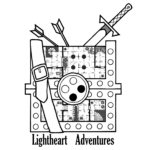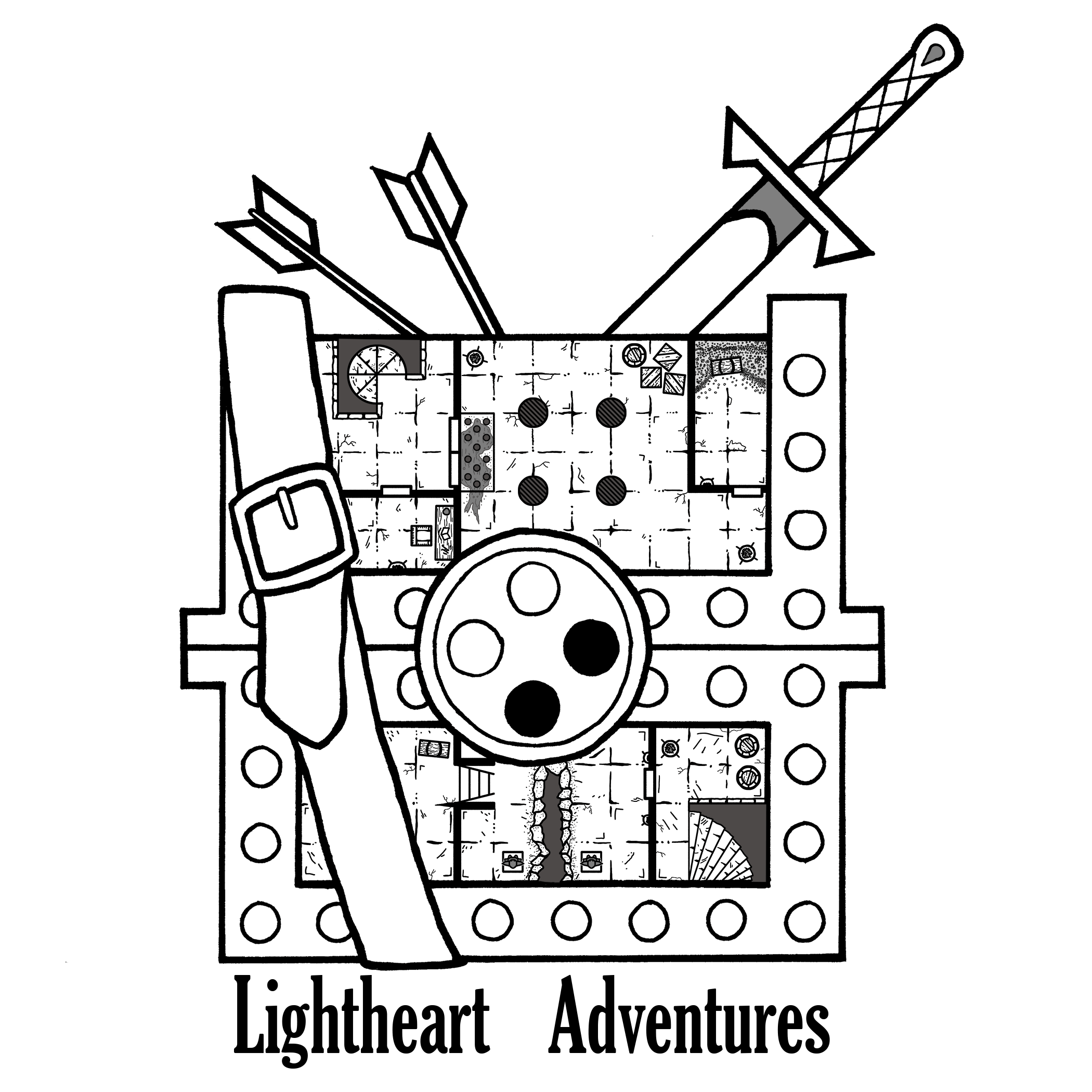Are you designing a new TTRPG or supplement and feeling overwhelmed? You’ve got the idea down; you feel confident in writing it, but you don’t know what to do next. Start here! In today’s episode, your host, Courtney, describes the very first steps you should take to get your project ready. We’re going over high level categories like art, layout, and marketing, and helping you get a grasp on how to get started with your new TTRPG project.
Want to work with Courtney one-on-one? Start here.
Disclaimer: This post contains affiliate links. If you make a purchase, I may receive a commission at no extra cost to you.
Download & Subscribe
Amazon Music | Spotify | Apple Music | Stitcher | RSS Feed
Buzzsprout | Apple Podcasts | Spotify | Google Podcasts | Amazon Music | Stitcher | TuneIn + Alexa | Podcast Addict | Podchaser | Pocket Casts | Deezer | Listen Notes | Player FM | Podcast Index | Castro | Podfriend | Podbean | RSS Feed
Show Affiliates / Some of Courtney's favorite things
FloDesk Easily create gorgeous emails. Get your 1st month free & 50% off for your first year.
Found Familiar Delicious coffee meets Dungeons & Dragons artwork. Use code lightheartadv for 10% off your order.
Friday Afternoon Tea Grab a cup of tea with blends based on your favorite nerdy series. Use lightheartadv for 10% off
Dice Envy creates beautiful dice in a variety of materials.
- Buzzsprout is my fabulous podcast host! Try it for free & receive a $20 Amazon gift card if you sign up.
Transcript
Courtney: [00:00:00] Hello, and welcome to Roll Play Grow, the podcast for tabletop entrepreneurs, creators, and fans. In this show, we dig into processes, challenges, tips, and really look at how to grow a business in the tabletop role play gaming space. Sit back and join in as we learn from the creators behind your favorite brands, about who they are, and how they are turning their passion for gaming into a career.
Welcome back friends. If you listened to the episode a couple of weeks ago about follow along with me on various business ventures, I talked about how I am going to start doing some shorter episodes in between my interviews where we dive into specific topics in a little bit more detail than what we’re able to do in those interviews. And I wanted to start this series off [00:01:00] with something that I feel like a lot of my listeners are trying to get into, and that is designing your own tabletop RPG games or supplements. Now, I’m not going to sit here and tell you how to design a game. That’s not my expertise where my expertise comes in and what we’re going to dig into is getting organized. And how to make this a reality. So you may or may not know that I am a career project manager.
I’ve been doing this for over a decade. And in the last couple of years, I’ve started working specifically with TTRPG. And with very small game designers that might be just themselves or we work together to create a team. And so these are some of the high level steps that I like to take with my clients or advise them to do right at the very beginning of a project. So presumably. You already have an idea.
Maybe you are already writing it. Maybe you have written it. What you are struggling with is [00:02:00] making the product into a reality. So the very first thing that we’re going to do, and that we’re going to talk about right now is just brainstorming. I don’t mean about your content. I mean about what are the steps that we need to take. So grab a piece of paper or word document. Or what’s even better is if you already have an account on a project management software, like Trello, Asana, Wrike, anything like that, that’s a great place to start. I don’t care where you do this, though.
Just start brainstorming. What we’re going to do is we’re going to create big sections. Like art. Layout. Editing. Marketing. Publishing. Fulfillment. If you’re planning on crowdfunding this, then you definitely need a crowd funding section. Once you have those large headers, large categories. I want you to sit and think about each of them and what are the things that would need to happen. And we’re not thinking about if you personally are able to do it. It’s just, [00:03:00] okay.
I know that I’m going to need some artwork. Or I’m going to need some cartography. So let’s write that down. You can go ahead and start thinking about am I an artist, if not, no. One of the steps we’re going to have to take is find artists. So you’ll just write that down then that will eventually become a task and your project management plan. Fine artists, or if you’re planning on using stock art, it’s look at stock art, same thing with cartography. Do you have the ability to create your own maps?
Do you want to hire a cartographer? Are you going to use something like Inkarnate? Whatever it is. Go ahead and jot down that that’s the step that you plan on taking. Now with layout again, same thing. Do you need to find a layout artist or are you capable of doing your own layout. What about graphic design?
Because if your crowdfunding, you’re going to want to have header images for all of the different sections on your Kickstarter or your backer kit page. Are you capable of doing [00:04:00] that with something like Canva or illustrator, Photoshop, anything like that? Or do you need to find a graphic artist? Now, if you’re planning on finding a layout artist, typically you can also have them make graphic art as well.
And I like to do that because they’re already going to be working on the same style. But either way, just think about what it is that you’re looking for. Editing. Absolutely. You want to do find at least a proofreader. It’s great if you can also find a content editor, but at least a proofreader, I don’t care how good you are at writing.
Everyone needs another set of eyes so make sure that you put find an editor as a task. When we get to marketing, that’s going to be a really large bucket, but at this point we’re not getting into minutia. We’re just going to talk about social media accounts. So. If you need to set up some, that would be a step like set up. Social media sccounts on blue sky threads, whatever, if you already have it great, you don’t need to jot that down. Just think about all right.
Social media [00:05:00] podcasts, actual plays. If those are things that you might be interested in pursuing, just jot those down at this point at this stage. Are you doing a campaign on Kickstarter or backer kit or something similar. Some of the big ticket items are going to be the prelaunch page and the actual campaign page itself. So are you going to have a video? Again,
you’re going to need artwork. You’ll meet graphic design for those headers that I already mentioned. Think about what your risks and challenges are going to be your tiers. You don’t have to decide what your tiers are. We are way too early for that, but just, those are things that, you know, you’ll have to come up with eventually. So once you have all of those jotted down, Then the big one that we’re going to write down is develop team. And what I want you to do at this point is, think about. What of all of these different categories? Are you either capable of doing right now or are wanting and willing to learn how to do. [00:06:00] A lot of beginning game designers. Are confident in what they’ve written. And they don’t think that they can afford to hire all of these people, which is a totally valid concern. And so the look into the different
tools that are out there. So, for example, I have mentioned Inkarnate earlier. There’s also dungeon scrawler for making dungeon maps. Those do exist and you can learn how to use them without being an artist. There is also ways that you can learn. You can watch YouTube videos and learn how to do your own layout. Now the trade off of this is that it is of course going to take a lot more of your time because you’re going to have to learn how to do it. And it may not look as professional as if you hired someone because everybody has to start somewhere.
But either way, it’s worth thinking about what it is that you’re capable of doing what you’re willing to do and where you need to find help for the rest of it. So [00:07:00] once, you know what it is that you don’t feel comfortable doing, or just don’t have the skills to do. That is where you’re going to write the different types of team members that you need to find.
So you’re looking for artists, you’re looking for cartographers sensitivity consulting, which I highly recommend, regardless of what your project is. Editing, proofreading. If you need a marketing coordinator, because you just do not want to be in charge of coming up with that plan or posting your social media content constantly. If you want to find someone like me that is able to help you get a plan together and stay organized. Regardless of what it is.
You’re going to jot down everything that you need to find for your team.
However, we are not actually going to start recruiting a team yet. Because remember at this stage, we are just the very beginning. We’re brainstorming. We’re trying to figure out what it is that we need to do to get started on this project. [00:08:00]
So this next part is going to depend on whether you’ve already started writing. Or if you are just at the beginning of all of this. So earlier we weren’t getting into the minutia of these tasks. But now I want you to sit with, okay. What do you still have to do before you would feel like you’re ready to start bringing in team members? So if that is you’ve only have an outline of your idea. Then great.
Let’s create some to do items or tasks around writing the game, writing the adventure. What is the time commitment that you can make each week to work on this project? Set deadlines for yourself. Find an accountability partner, even if it’s just a friend. To say, Hey, I would love if we could check in every week, every two weeks, and I can just update you on my process.
We don’t have to get into detail, but just, I had this goal of [00:09:00] writing. 500 words. And one week, did I do it?
Because I find that that having an accountability partner. At least for me is a lot more motivating.
Some other things that you can be doing at this point are gathering your inspiration for artwork. If you are planning on hiring artists or cartographers,
I want you to start doing some Google image searches. That are the genres that you find inspiring. So, if you are basing your game off of a specific movie or anime, then look that up, find the right vibes, find colors, find the art styles that inspire you and just start. Putting them all together on a document or presentation. Even just a list of links is helpful for when you eventually start trying to find artists.
And then I want you to go back to that marketing section and think more [00:10:00] deeply about. What social media platforms you’re already involved in. Are you in discord servers? That are there for collaboration that are specific to the game that you’re writing a supplement for or indie games in general. If you’re not go ahead and find those servers.
Get involved. Start talking. Start offering feedback cause you really need to start making connections. Marketing is not just about Hocking your product. It’s about helping people find why it is that your game fits something that they. Didn’t even know that they were wanting. And they’re not going to be able to trust you if they don’t know who you are. You’re not going to be able to say, Hey, I’ve got this game coming out in a week. Back at for me. If they don’t know who you are and you haven’t been talking about the game for at least several months, you’re going to have a very hard time getting your crowdfunding campaign to launch. So start making those connections.
[00:11:00] Start Think about where you don’t already have a presence and thinking of ways of how you can build up that presence. And the big thing that I’ve learned with social media is that it’s not just about the posts that you make. It’s about the interaction that you have with other people.
So if people do comment on your posts, reply back, But making sure that you’re going out there, you’re sharing other creators. You’re commenting on other people’s posts The more you do it, the more you get your name out there, the more followers you get, the easier it will be when you do eventually launch your game. Think about. Where you are and where you can be building up your presence a bit more. Do you have an email list? And I do think that that’s going to be a topic that we could dig into more deeply in a later episode, but it’s also quite important to set up an email list because as we’ve seen with Twitter over the last. Year.
And with the big old question mark, about how long ticktock is going to be around. Since it’s supposedly getting banned [00:12:00] very soon in the us.
Social media is not a reliable place to build up your following. The only area where you can control your own audience is an email list. Now I’ll be the first to admit that I’m not great. I keeping up with mine. But it does exist. It is out there. And so at any point I can whip up an email and contact 2000 people. And let them know what’s going on or what updates are there, give them links to my products. It is incredibly important that you build up an email list. There are free platforms. Like MailChimp is a very popular one that you can use to just get started. But again, we’ll go into this in a much more detail in a later episode.
So. I feel like this has been a lot to think about. At this point. So I am gonna go ahead and wrap up this episode. But we’re going to keep talking about this in future [00:13:00] episodes and just, you know, how do you go about finding a team? We’ll talk about that. We will talk about what are some things that you should be thinking about when you’re actually setting up your crowdfunding page? But at this point, I just want you to do these high level tasks and really think about what are the steps that you need to take.
What are you needing to find help with? And. What are you willing to learn to do yourself? If you’re trying to keep your budget low.
Regardless of how far along you are in your project. Everybody always needs some organization. And I hope that these beginning tips are helpful for you. Let me know if you have any questions and if you ever want to chat with me, one-on-one. You can go to my website. Lightheart Adventures dot com. And click on the project management button on the main menu and you’ll be able to [00:14:00] find some different offerings that I have, whether that’s just, oh, hour long one-on-one session to talk about a specific topic.
If you want to have help with getting things started at the very beginning of your projects. Or if you want to hire me to be your project manager. You can find out information about all of that on my website, but either way going to keep giving you guys these tips. I hope that helpful. And let me know what y’all think in the comments. [00:15:00]
Thanks for dropping by! We would love to know who would like us to interview, so please drop a comment here on the blog, on Twitter, Facebook, Instagram, or Discord to let us know who your favorite creators are! If you’d like access to more maps and content, including downloadable PDFs of our adventures, check out our Maps Patreon or Podcast Patreon. We’re able to do what we do because of all our amazing Patrons!
Recent Episodes
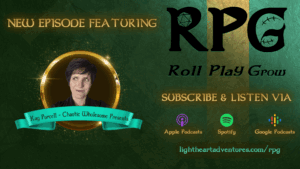
097: Community Management & Running a Production Studio with Kay of Chaotic Wholesome Presents
Introduction In this episode, we chat with Kay Purcell, co-founder of Chaotic Wholesome Presents, a TTRPG production studio known for creating engaging stories and
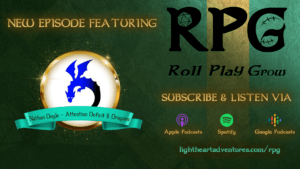
096: Making a Map Puzzle Cube with Nathan of Attention Deficit & Dragons
Introduction In this episode, we sit down with Nathan Doyle, the game designer behind ‘Attention Deficit and Dragons’. Nathan discusses his early gaming experiences,
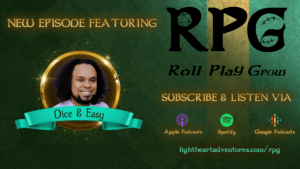
095: Celebrating 4 years of RPG & exploring the intricacies of content creation with Fondue of Dice & Easy
Introduction It’s the four-year anniversary of Roll Play Grow! Thank y’all so much for being here. This episode features an interview with Fondue, the
